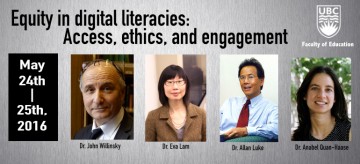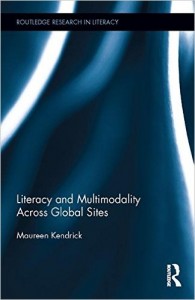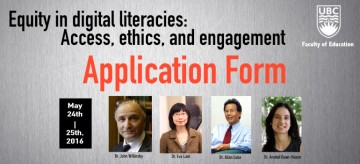Equity in Digital Literacies: Access, Ethics and Engagement
These keynotes, which are part of a two-day closed conference, will be open to the public during the times indicated below.
Equity in Digital Literacies: Access, Ethics and Engagement*
May 24th and 25th, 2016
Ballroom of the Education Centre at Ponderosa Commons,
University of British Columbia
*Funded by SSHRC, UBC SPARC, the Department of Language and Literacy Education, and LLED’s Digital Literacy Centre. Organized by Theresa Rogers, Jim Anderson, Ron Darvin (UBC) and Suzanne Smythe (SFU)
Public Keynote Sessions
May 24
| 09:00 – 10:00 |
John Willinsky: A Digital Pedagogy of Civic literacy and Civil Rights| 13:30 – 14:30 |
Eva Lam: The Social (Re)construction of Scale in Video Documentary: Exploring Youths’ and Practitioners’ work
May 25
| 09:00 – 10:00 |
Anabel Quan-Haase: What is the Social and Economic Cost of the Digital Divide in Canada? Access, Digital Literacy and Educational Attainment| 13:30 – 14:30 |
Allan Luke: Literacies and Education: Forward and Back after Neoliberalism, ‘Globalism’ and Backlash
May 24 | 09:00 – 10:00
A Digital Pedagogy of Civic Literacy and Civil Rights

John Willinsky
Stanford University and Simon Fraser University;
Affiliate Professor, University of British Columbia
A wide range of online activities today speak to the opportunities and responsibilities of a civic literacy, involving civil rights and responsibilities that have not typically been part of literacy and language instruction. This talk reviews four relevant scenes of such literacy in the exercise of intellectual property rights, knowledge creation, online journalism, and public science. It invites the audience to consider what can be and needs to be taught in both preparing for and engaging students in these four domains of the public sphere. Amid the online threats of trolling, bullying, and, well, enough said, it still falls to the schools to look for ways of realizing its original promise of raising the educational quality of democratic life within just such public domains.
John Willinsky has written extensively about the educational implications of such knowledge systems as literary theory, historical dictionaries, and European imperialism. More recently he has focused on both analyzing and altering scholarly publishing practices to understand whether this body of knowledge might yet become more of a public resource for learning and deliberation.
May 24 | 13:30 – 14:30
The Social (Re)construction of Scale in Video Documentary: Exploring Youths’ and Practitioners’ work

Eva Lam
Northwestern University
Drawing from a study of video documentary making in a high school with students from immigrant families and interviews with media practitioners, Dr. Lam will discuss how the representational or discursive practices of “scaling” in social-issue documentaries afford the potential for re-constructing our understanding of the relationship between different socially stratified spaces. Her study of social documentary explores how particular spatiotemporal scopes of experiences and practices are represented and made visible through the voices of particular characters and how the voices of different characters and institutional actors are juxtaposed or linked to each other to constitute particular relations between them. She is interested in how the boundaries among different socially stratified spaces and the language practices associated with these spaces are strategically exposed and rejigged or reordered in documentary storytelling.
Eva Lam is an associate professor Northwestern University in Learning Sciences and Asian American Studies. She studies the social contexts of language use and learning, new literacies, language varieties, and socialization practices in new media environments. Her work draws from sociocultural theories of literacy and language learning, media and communication studies, and the sociology of migration to investigate how young people, especially youth migrants and children of immigrants, engage in new forms of multilingual and multimodal learning and identity formation with digital and transnational media.
May 25 | 09:00 – 10:00
What is the Social and Economic Cost of the Digital Divide in Canada? Access, Digital Literacy and Educational Attainment

Anabel Quan-Haase
University of Western Ontario
A central aspect of inequality in the twenty-first century is the digital divide, the systematic differences that exist between social groups in access to and use of information and communication technologies. Canada faces several unique challenges in overcoming the digital divide including immigration, cultural diversity, aging, and geography. The recent move toward mobile devices such as smartphones, phablets, and smartwatches has created new concerns and inequalities, whilst also providing new opportunities for those lagging behind. The present talk has three goals. First, it will provide an overview of the current state of the Canadian digital landscape. Second, the talk will discuss the digital literacy paradox, a new model for understanding how digital experience and exploration are linked to the development of digital literacy, which highlights how learning is a social process and thus digital literacy is best acquired in social settings where family, peers, mentors, and gatekeepers come together to provide an environment for exploration. Finally, the talk draws implications for the educational system focusing specifically on digital literacy as an everyday practice embedded in daily routines, the digital humanities as a new frontier for educational attainment, and the lack of ‘tech’ role models in a celebrity-driven attention economy.
Anabel Quan-Haase is an Associate Professor at the Faculty of Information and Media Studies and the Department of Sociology, the University of Western Ontario. Currently, she is the director of the SocioDigital Lab at Western. Her current interests also lie in how electronic resources are changing the nature of scholarship, innovation, and creativity. She currently holds a SSHRC Insight Grant to study serendipity and digital environments in the humanities, and a SSHRC Insight Development Grant to study digital divides in the senior population.
May 25 | 13:30-14:30
Literacies and Education: Forward and Back after Neoliberalism, ‘Globalism’ and Backlash

Allan Luke
Queensland University of Technology (Emeritus)
University of Calgary
Affiliate Professor, University of British Columbia
This talk will serve as a response to and dialogue with the conference presentations and discussions, commenting on possible future scenarios and challenges for multiliteracies and literacy education as fields of educational development, local intervention and political activism.
Allan Luke is Emeritus Professor, Queensland University of Technology, Brisbane, Australia. His last major work was as author and chair of Australia’s most comprehensive empirical study of Aboriginal and Torres Strait Islander education in 2013. He began his work as a teacher at Semiahmoo Secondary School in White Rock in 1974 and completed his teacher training and doctoral studies at Simon Fraser University. He currently is a working musician in Brisbane, Queensland, Australia.
Equity in Digital Literacies: Access, Ethics and Engagement

To apply for this conference, please click here.
In language and literacy studies, the proliferation of new digital tools and forms of symbolic representation has raised serious concerns about access to digital technologies, the ethics of new language and literacy practices, and the educational polices that link the broad digital world to learning contexts within and outside of schools. While contemporary sociocultural, critical, and plurilingual perspectives have added theoretical complexity to the study of digital language and literacy, the realities of online life have outstripped our theories and our practices. The purpose of the proposed conference is to use three key themes related to digital equity — access, ethics, and engagement — as a means of focusing attention among scholars, teachers and community members on current and needed research, pedagogical applications and policy outcomes at the intersection of digital and language and literacy practices in educational contexts.
It is vital to the future of Language and Literacy Education that we re-examine the role of research in developing educational practices and policies that speak to these contemporary concerns as people of all ages take up digital tools in a range of learning environments and intersecting and often contested spaces (virtual/real, local/global). Addressing the interrelated issues of access, ethics and engagement is particularly timely and relevant in the context of contemporary debates related issues of access, state power, democratic participation, privacy/surveillance, intellectual property rights, free speech and corporate control.
This two-day conference will take place May 24th to 25th, 2016 at the University of British Columbia. We will bring together key international and Canadian researchers, graduate students, teachers, and community educators to identify the most important current and future research and policy directions. We will address the need for an interdisciplinary framework for thinking about equity in digital language and literacy practices in learning environments in the contemporary technology and information landscape.
Keynote speakers include Professors Eva Lam of Northwestern University, Alan Luke of the Queensland University of Technology, John Willinsky of Stanford University and Anabel Quan-Haase of University of Western Ontario. Faculty members and graduate students in the Faculties of Education at UBC and Simon Fraser University with expertise and interest in digital literacy will engage in dialogue with the invited scholars, each other, and a range of community literacy partners from the Vancouver School Board, Burnaby House, Downtown Eastside Adult Literacy Roundtable and UBC Learning Exchange to address the key themes outlined above.
New book by Dr. Maureen Kendrick
 Over the past three decades, our conceptualizations of literacy and what it means to be literate have expanded to include recognition that there is a qualitative difference in how we communicate through modalities such as the visual, audio, spatial, and linguistic and that different modes are combined in complex ways to make meaning. The field of multimodality is concerned with how human beings use different modes of communication to represent or make meaning in the world. Despite the rapid growth of international research in this area, accounts of a broader range of global sites, particularly economically under-resourced and culturally diverse contexts such as Sub-Saharan Africa, remain under-researched and under-represented in the literature. This book contextualizes a range of literacies including health literacies, community literacies, family literacies, and multilingual literacies within broader modes of communication, most specifically play and the visual. The claim is that powerful pedagogies, methodologies and theories can be constructed by taking a more detailed look at multimodal meaning-making in diverse contexts. By describing and analyzing multimodal practices and texts across a diverse range of contexts, the book highlights different constructs, issues and emerging questions dealing with the study of literacies and multimodality.
Over the past three decades, our conceptualizations of literacy and what it means to be literate have expanded to include recognition that there is a qualitative difference in how we communicate through modalities such as the visual, audio, spatial, and linguistic and that different modes are combined in complex ways to make meaning. The field of multimodality is concerned with how human beings use different modes of communication to represent or make meaning in the world. Despite the rapid growth of international research in this area, accounts of a broader range of global sites, particularly economically under-resourced and culturally diverse contexts such as Sub-Saharan Africa, remain under-researched and under-represented in the literature. This book contextualizes a range of literacies including health literacies, community literacies, family literacies, and multilingual literacies within broader modes of communication, most specifically play and the visual. The claim is that powerful pedagogies, methodologies and theories can be constructed by taking a more detailed look at multimodal meaning-making in diverse contexts. By describing and analyzing multimodal practices and texts across a diverse range of contexts, the book highlights different constructs, issues and emerging questions dealing with the study of literacies and multimodality.
